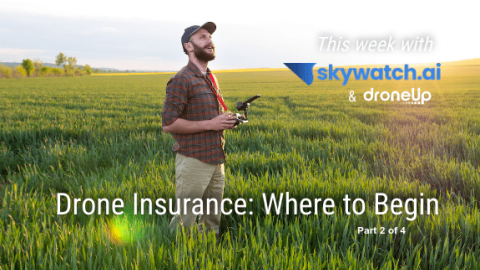Once you feel that you have the proper education and training to get going with your drone business, you are ready to start looking into insurance options.
First, there are some important factors to consider. Your insurance policy should be tailor-made to your personal needs; and, to get your process started easily, we’ve listed out some of the best beginner questions to ask when looking into drone insurance:
- What is the length of my operation?
If you plan on flying for a few hours you may benefit from an on-demand “pay as you go” plan. An on-demand policy allows you to activate your insurance coverage for each specific flight on an hourly basis. You can customize the coverage to meet your needs or your client’s needs. What’s more, you can purchase drone insurance up to five minutes before your desired flight! more, you can purchase it up to five minutes before your desired flight! Pilots who fly long hours on numerous occasions, and have higher coverage demands, will benefit more from a monthly plan. This option covers your flight activity on an unlimited monthly basis so that you don’t have to worry about planning your missions each and every time you want to fly. Note: You can also purchase an annual plan that will cover you continuously over the course of the year.
- Am I flying alone? If there are other people accompanying you throughout your drone mission, you will want to make sure they are covered under your insurance policy as well. Whether you have a co-pilot, visual observer or just some friends tagging along, they too can and should be protected in the event of an accident. By naming additional insured on your policy, those flying with you will be able to benefit from the same coverage as you. An additional insured can be a person, venue, or a company. When flying with SkyWatch.AI, you can have an unlimited amount of additional insured, completely free of charge.
- What equipment am I using? Depending on what drone accessories and equipment you have, you will want to consider getting extra coverage that protects against physical damages to your drone. Pilots who use expensive equipment will want to add hull coverage to their policy so that their drone is properly protected if anything happens to it.
- What are the potential risks involved? It is important to remember that each drone pilot has different needs, and therefore, each mission requires a different risk assessment. A real estate drone photographer will face different risks from that of a pilot using a drone for construction surveying. It is important to take some time to consider what obstacles could be in your way so that you can think about what policy meets your requirements.
Once you know the risks involved, you will be able to determine your liability limit. If you experience an accident with your drone, having liability insurance will protect you if you are found liable for another person’s bodily injury or property damage. Based on the limit you choose (anywhere from $.5 million to $10M), you will be covered for medical and legal bills involved in a potential accident.
Once you have thought through these questions, you are ready to start putting together your insurance policy. DroneUp and SkyWatch.AI understand the importance of building a drone network that promotes safe and insured flying. As a pilot in the DroneUp pilot network, once you accept a mission through the app, you will automatically be given a comprehensive on-demand insurance policy by SkyWatch.AI. This means that you won’t have to worry much about choosing a policy by yourself. This guide will walk you through all the necessary steps regarding the DroneUp and SkyWatch.AI integration.
Visit tomorrow at 2 PM for SkyWatch.AI’s “Why a COI?” (Certificate of Insurance).
